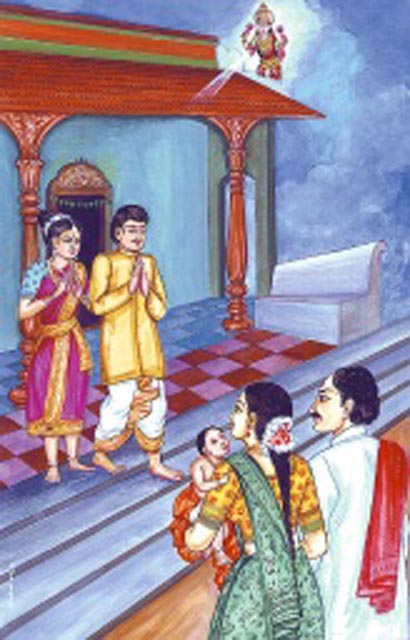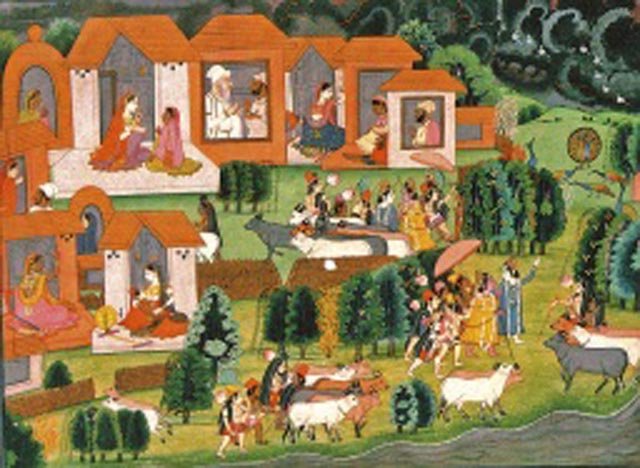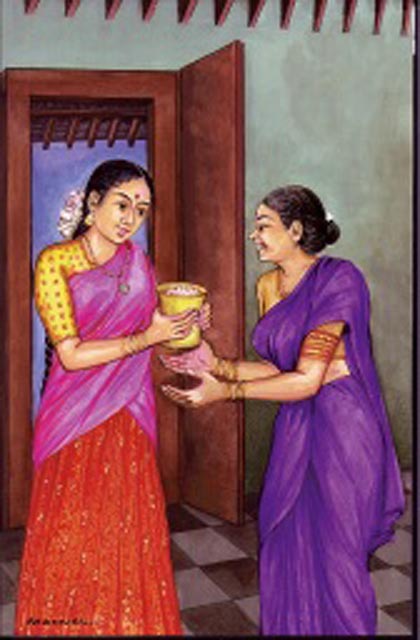
Do you think you are the perfect host?
Well, here’s a story that will make you re-evaluate your hospitality skills, for the host in this tale is none other than Lord Krishna. When his boyhood friend, Sudama – hungry, impoverished and in rags – arrived at the palace, the guards almost did not allow him in. But Lord Krishna, overjoyed to see his old friend, received him with open arms and joyfully led him to his throne. He personally washed his feet and fed him with his own hands.
Sudama had brought him a humble gift, a handful of parched rice tied onto the corner of his shawl and was too ashamed to give it to him in front of all the fine courtiers, but Lord Krishna opened the pouch and ate the grains with pleasure and appreciation. To him, the true value of this valueless gift lay in the affection with which it had been offered.
If Lord Krishna was the perfect host, then Sri Ram embodied the perfect guest. During his exile in the forest, he visited Subari, a lowly woman who in her devotion and anxiety to give him only the very best, tasted each berry before she fed it to him. With grace Sri Ram accepted her offering, seeing the love with which it was given.
Such is the true nature of Hindu hospitality.
From the days when Gods walked the earth to present days, there is little to beat Indians when it comes to welcoming guests. And it all starts with welcoming God into their homes. No matter what their religion, for Indians a small home shrine is a must, be it even set up on a mere shelf.
Rare is the Hindu home without a shrine for the deities. From huge family temples of marble in the homes of the wealthy to modest shrines in closets and on walls, Hindus house their Gods. Daily, images of the family Gods are bathed, clothed and offered fruit, flowers and incense, accompanied by chanting and the tinkle of the bell.
At Diwali, the Festival of Lights, when the Goddess Lakshmi visits the homes of devotees, there is a frenzy of cleaning, sweeping and painting as homes are beautified and decorated with hundreds of earthen lamps to greet the Goddess.
At the very heart of Hinduism is the belief that the Almighty permeates everything. When Baby Krishna, accused by Mother Yasodha of stealing butter, was asked to open his mouth, she was amazed to see the entire universe, galaxies and stars all within him. Indeed, the Hindu belief in the presence of the Paramatma in every living thing transforms each one of us into God.
‘Matri devo bhava, Pitro devo byhava, Athithi devo bhava’ means “Mother is Goddess, father is verily the God and a guest is God.’ The regard, respect, care and submission that must be accorded to God has to be accorded to a guest. In fact ‘athithi’, the Sanskrit word for guest means ‘who comes without appointment at any time.’
There are slokas that extol the act of giving and sharing. “Teiha dattan appradayobhyo bhunkte stena eva saha” – ‘whatever we have are God’s bounties. He who enjoys them without sharing with others is verily a thief.’ Indeed, the concept of welcoming strangers and sharing every last bit of food and water with them is well engrained, embedded into Hindu philosophy. All the Hindu texts have emphasized the importance of serving guests before one’s self. The Vedas declare ‘Food is life’ and therefore food should be given, because it’s the highest offering.
In the Manava Dharma Sutra, also known as the Manu Smriti, the host is directed thus: “All the food shall be very hot, and the guests shall eat in silence. Having addressed them with the question: Have you dined well, let him give them water to sip, and bid farewell to them with the words: ‘Now rest.'” K.T. Achaya in ‘Indian Food: A Historical Companion’ points out that guests had an honored rank in Vedic society and after being ceremoniously received, were offered the ambrosial beverage, Madhuparka consisting of ghee, curd, milk, honey and sugar.
The ancient Hindu texts say the guest has to be shown honor by the host going out to meet him, offering him water to wash his feet, by giving him a seat, by lighting a lamp before him, by giving him food and lodging and by accompanying him some distance when he departs. Thousands of years have passed but this code of etiquette remains basically the same.
“The guest is God,” says Sheela Venkatakrishnan. “You offer your guest the same love and respect that you would offer to God. Simple! The most striking example of hospitality is when the whole town of Kumbakonam, where my father hails from, turns host during the week of the Mahamaham.” Thousands upon thousands of people come for the Holy Dip in the tank of the Kumbareswaran temple, and says Venkatakrishnan, every home opens its doors to accommodate and feed all who reach its doorstep. No one is turned away.
There was also a time when it was the practice for the head of the household to stand at his doorstep at mealtime and ask loudly, not once but thrice, “Is there someone who needs to be fed?” Sometimes a traveler or a poor man would come in for food. It was only after the guest had been fed, would the family eat.
In Tamilnadu, many of the bigger and older temples have the ‘Annadanam’ scheme. Recently, with the active patronage of the Government, many more temples have revived this practice, where they feed a minimum of 100 people each day at noon.
Even Muslim darghas have adopted this practice, while the Sikh Gurudwaras have always followed it.
In Hindu households the hospitality extends to all of God’s creations. Walk near the Gateway of India in Mumbai at dawn, and you will see people feeding the birds and the fish before they start their day. In the South the feeding of crows at mealtime is a must before the family sits down to its own meal. And the cows of course, are venerated and can always be assured of a good meal, as they wander from house to house.
Although I did not grow up in a particularly religious household in Delhi, the concept of hospitality was still very Hindu, both in giving and receiving. I remember we stopped at a friend’s home in Mathura after a pilgrimage to Haridwar. The hosts received us like VIPS, with open hearts and minds. We ate a wonderful vegetarian meal in the cool evening air in their garden, and then as the stars came out, the string beds were brought out into the open, for family and guests, each covered with a mosquito net to ward off insects.
Another time I was with my older brother who had to stop at an acquaintance’s home in Old Delhi to pick up some paperwork. The family knew we were coming and had prepared a feast. In this very Hindu home, we removed our shoes, washed our hands and feet and sat on the immaculate kitchen floor with the hosts while a Brahmin cook served us one of the most memorable meals I have ever eaten.
Indeed, you can never leave an Indian household without gaining a few ounces, for you will certainly be plied with some snacks, some tea at the very least or a glass of cold rose sherbet in the heat of summer. In our home in New Delhi, family and friends came to us from everywhere, and they certainly got more than a glass of water: delicious meals, a comfortable bed, domestics hanging over their every need, and yes, even a guided tour of Delhi, and sometimes, even Agra.
Nor was the hospitality reserved just for visiting guests. Daily food was never eaten without my mother consecrating a small portion to God, and also a portion being given to a passing needy person or a cow.

Relatives came and were joyously received, especially on days of shraddha when the priest, uncles, aunts and cousins would descend on the house to honor the memory of ancestors. The house would take on an almost festive air, as scores of children erupted out of the arriving cars. After the prayers and feeding the priest, the aroma of sizzling puris and pakodas wafted from the kitchen while elders embarked on a massive talkathon.
Indian hospitality, of course, goes a long way back to the days of emperors like Ashoka who initiated guest houses across the country for travelers, provided cool drinking water and planted trees to give shade to weary visitors. Since India is 80 percent Hindu, this Hindu notion of hospitality has infiltrated into all parts of the nation, even the smallest villages. Mention also has to be made of the Hyderabadi brand of hospitality that has few parallels. Made famous by the Muslim nawabs of Lucknow, those on the receiving end enjoyed courtesy, food, drink and congeniality – all served with an elegant world-class flourish.
Little wonder then that in multicultural India these varied notions of hospitality have coalesced to produce one of the most generous and warm people. Visitors to India come away with awed stories of the way they were embraced and included in every family celebration – in fact, made part of a larger extended family. Often these relationships last over the years.
In fact, you cannot go to even the humblest home without being honored with food and drink, as Janet Chawla found out some years back. Chawla, an American who married a Sikh and now lives in New Delhi, believes the charm of India is in the graciousness of its people, although it is getting less in the big cities. She feels there is a grace, a way of sitting together, singing together at weddings. People in small villages, she says, really are very giving, sharing the little they have.
“In America, if we were sitting and working together, and I had a sandwich – I would open it and eat it. An Indian would never do that,” she says. “There is this kind of culturally prescribed sharing which I find very gracious.”
Hindu tradition lays great stress on the respect due to guests. The greatest hurt is the thought that the host or hostess does not enjoy one’s presence in their home. Therefore, Hindus go out of their way to make each guest feel welcome. It is proper protocol to drop whatever one is doing, no matter how important, to entertain a visitor. One of the privileges of friendship in the East is being able to drop by any time without advance notice.
Mitesh Patel, whose family hails from Kathiawad region of Gujarat, says that in his hometown hospitality is extended to everyone: “When a guest comes to our house, we rarely let them go without offering a good meal. We don’t feel that guests are a burden whether they are staying for few hours or few days and offer them full assistance.”
He gives the example of his uncle who left the ancestral village 30 years ago to settle in the city of Rajkot. Three decades later, if anyone from the village comes for a medical check up to the big hospital in the city, his uncle makes sure healthy home-made meals go out to the patient every single day.
The concept of hospitality extends also to welcoming customers to business settings. In fact, hospitality makes good business sense too. Go into a sari shop in crowded market places and the owner will automatically offer you a soft drink in the heat. If you’re shopping for a wedding trousseau, they are even more solicitous – offering coconut water, a snack, and drinks from the market.
But certainly these offerings are the small courtesies that begin at home and are great for winning friends and customers. I recall my father in his jewelry store not only offered soft drinks, paan in silver containers and candy but also gave the kids who came to the shop foot rulers and other small items as gifts.
Yet, one does have to admit that Hinduism’s glowing hospitality report card does have one very big black mark on it, something which the Gods probably did not ordain but which wily man has reinterpreted for his own gain – the treatment of the so-called lower castes. It is really quite inconceivable that a loving religion, which proclaims that God is in every living thing, would denigrate a whole class of human beings as untouchables.
The story of everyday village India is full of the low castes being turned away from village wells, being whipped for worshipping at the temple or merely for passing by the home of a Brahmin. While things are improving in the big cities where caste and creed lose their importance in the great economic bazaar and where politicians see the lower castes as potential votes, the village scene remains woefully medieval. Buried in the back pages of newspapers are frequent stories of atrocities, which should shock us all from our complacency.
In the larger hospitality picture, things seem to be changing too – for the worse- as the time-honored extended family finally battles modernity. As younger family members move away where their jobs take them, the joint family system is undergoing strains. Older people are often left to fend for themselves.
Women too are joining the work force in large numbers and since time, effort and budgets are stretched, the old-time hospitality is often compromised. Earlier, visitors could just drop in but now hosts get agitated to find unexpected guests on the doorstep.
Sheela Venkatakrishnan would agree: “Living in nuclear families, who is there to take care of the home, leave alone a guest? You tend to think twice about visiting a friend or relative, not wanting to impose or inconvenience them in any way.”
She points out that they have many relatives in joint families who welcome them with open arms. She herself lives in a joint family where someone is always home: “The doors of our home and our hearts are open to God and all whom He chooses to send our way.”
The picture, however, is bleaker in the Diaspora, where immigrants struggle with the beliefs they grew up with and the pressures of their new environment. Most manage to keep the hospitality intact for family and close friends. Some go to extraordinary lengths, sponsoring relatives and even opening up their homes to them till they get settled.
The Gujarati community is particularly strong in this respect and many continue to live in large extended families abroad. This sense of caring is extended to the entire community and in fact, many Patels have managed do so well in the motel business because of their unity and financial support of friends and relatives. No wonder the Gujaratis command a whopping of the motel industry. They are well trained in the ways of hospitality for as one of the successful hoteliers, H.P. Rama says, “We Indians believe the guest is God.”
Mitesh Patel, who lives in Edison, New Jersey, came to the U.S. when he was 15, so he has seen life on both continents. Now 24, he believes that Hindu hospitality has probably lessened in countries like the U.S, Canada, and the U.K but not in India: “I believe the reason is quite simple. NRIs are busy making big bucks in these countries. Sometimes even family members don’t see each other for a few days because they are busy working so they feel that it’s hard to accommodate a guest.”
Indeed, living abroad, notions of hospitality do undergo a change. For instance, according to Indian standards, it would be considered quite impolite to ever leave visiting houseguests alone; yet Westerners would find such closeness all the time grating, a loss of their private space. Also, abroad, one would never dream of dropping in on acquaintances without calling ahead. This is a culture where even children do not just play but have organized ‘play dates.’
Indians living abroad do have to contend with housework, their jobs and the daily commute, all without the support of extended family or domestic helpers. So their standards of hospitality do diminish. Some compromise, by putting guests in hotels or taking shortcuts in their care.
Summer, especially, means an endless barrage of guests from India and points in the Diaspora. Homes become as crowded as the Grand Central Terminal and hosts are faced with a multitude of tasks. As one exhausted woman, whose house was full of summer guests, told me, “Houseguests are like fish: after three days, they stink.”
From being treated like Gods to stale fish is quite a jump. While the pressures are definitely there for the hosts, to some extent their attitudes have also changed: after all, the rhythms of the place where you live do change you. Living frenetic lives in the west, they tend to become more brusque, more cynical. Standards of hospitality are indeed changing and one wonders at what point is modernization at the expense of true hospitality?
“The guest is God, not an intruder,” said Satguru Sivaya Subramuniyaswami. ” When someone steps up to you, drop your work. People are more important than paper. People are more important than giving oneself to the computer. People are more important than anything else. People are the working-out of your karma.”
Yes, it may help to remember an old Indian saying: ‘Dane Dane Pe likha hai Khane wale ka naam’ (On each grain is written the name of the eater). The people who turn up on your doorstep are meant to be there, part of your karma, part of the big cosmic play. Of course, it’s hard to see it quite that way when you are under stress at work and still have to produce dinner for your guests.
HOW TO BE THE PERFECT HOST 101
For people caught in the modern world of hurry and scurry, it would be good to refresh their memories on how to be perfect hosts – and perfect guests. There is etiquette to be followed in both roles and if each plays their part well, the whole experience can be rewarding.
Hosts should give of themselves with a generous and open heart, making every effort to make their visitor’s stay a memorable one, where the kindnesses and warmth are vast, even if the budget is tight. They should do all they can to entertain and help the visitors in a new and bewildering place.
Guests should make every attempt to be considerate, informing their hosts of their length of stay ahead of time. They should pick up after themselves and not add to the harried hostess’ tasks. Bringing small gifts for the family members, entertaining the children or perhaps offering to take them out to dinner are small gestures that are always appreciated.
Hospitality is indeed a virtue that has many benefits for the receiver and also the giver, as these small kindnesses smooth social connections and build relations. It also shows the next generation the way to continue the beliefs of their ancestors. And of course, often the shoe is on the other foot – and the host himself becomes a guest. So he should treat his guests as he himself would like to be treated.
There are so many stories of God Vishnu himself donning beggar’s raiment and coming to the door for alms. So the next time the doorbell rings, welcome the guests with an open heart. Look beyond the facial features, the clothing and the physical bodies into the eternal soul which glows within each of us like the purest of gold. This is the Self that the Bhagavad Gita says is immortal, the one that water cannot wet, sword cannot cut nor fire burn.
And so, bending low, with folded hands, welcome the Paramatma, the God who is within each of us.
© Lavina Melwani
Illustrations, courtesy Hinduism Today




1 Comment
Pingback: Hindu Hospitality